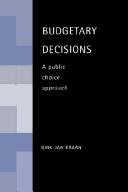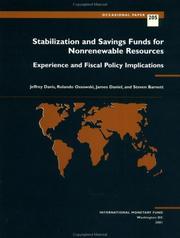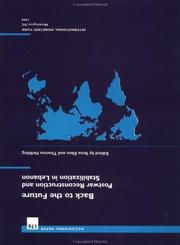| Listing 1 - 3 of 3 |
Sort by
|

ISBN: 0521558670 0521418712 0511628323 0511881002 9780521558679 Year: 1996 Publisher: Cambridge : Cambridge University Press,
Abstract | Keywords | Export | Availability | Bookmark
 Loading...
Loading...Choose an application
- Reference Manager
- EndNote
- RefWorks (Direct export to RefWorks)
This book provides an introduction to the positive theory of the budgetary process based on the theory of public choice. Although budgetary institutions are very diverse, both between and within countries, it is possible to identify key elements which are common to all forms of representative government. The author identifies these key elements as the supply of services by public agencies; demand for services by political bodies (cabinet, houses of parliament, etc); negotiations between administrators of agencies and political bodies in an 'internal market'; and decision-making in the form of budgetary and substantive legislation. The book develops a step-by-step model which incorporates all these elements, a model which can be used to explain and predict budgetary decisions in existing institutions, as well as to analyze institutional change, including cost budgeting and various forms of privatization.
Budget process. --- 336.1 --- #SBIB:35H221 --- #SBIB:35H006 --- #SBIB:IO --- #SERV: inv. Leuven --- Begroting 336.12 --- Public finance, government finance in general --- Financieel management bij de overheid: budgettering --- Bestuurswetenschappen: theorieën --- 336.1 Public finance, government finance in general --- Budget process --- politique budgetaire --- grande bretagne --- 336.440 --- begrotingsbeleid --- groot brittannie --- Bevoegdheid van de regering en van de kamers inzake begroting: algemeenheden. --- Finance, Public --- finances publiques --- management --- secteur public --- 336.450 --- 336.451 --- 336.61 --- AA / International- internationaal --- openbare financien --- openbare sector --- Bevoegdheid van de regering en van de kamers inzake begroting: algemeenheden --- Uitvoering van de begroting. Wetgeving betreffende de openbare boekhouding: algemeenheden --- Begrotingsjaren en begrotingsstaten. Rijksmiddelenbegroting. Begrotingstekort --- Financieel beleid --- Social Sciences --- Political Science --- Management. --- Cameralistics --- Public finance --- Public finances --- Currency question

ISBN: 1589060199 1462319920 1452725772 9781589060197 Year: 2001 Volume: 205 Publisher: Washington, D.C. : International Monetary Fund,
Abstract | Keywords | Export | Availability | Bookmark
 Loading...
Loading...Choose an application
- Reference Manager
- EndNote
- RefWorks (Direct export to RefWorks)
This chapter examines whether funds can help countries pursue good macroeconomic, and especially fiscal policies, and consequent design issues. Nonrenewable resource funds (NRF) have been suggested as a way of dealing with the effects of price variability, making it easier to put revenues aside when prices are high so that they can be made available to maintain expenditures when prices are low. Funds may also serve as mechanisms to allow part of the nonrenewable resource wealth to be shared by future generations. A detailed evaluation of country experience suggests that NRFs have been associated with a variety of operating rules and fiscal policy experience. In several cases, rules have been bypassed or changed and they do not themselves seem to have effectively constrained spending, and the integration of the fund's operations with overall fiscal policy has often proven problematic. Whether the political economy arguments for an NRF outweigh the potential disadvantages will need to be considered based on the situation in each country.
Money. Monetary policy --- Public finance --- Appropriations and expenditures --- Finance, Public --- Sustainable development --- Nonrenewable natural resources --- Fiscal policy --- Finance --- -Fiscal policy --- beleid --- natuurlijke rijkdommen --- 336.2 --- investissements --- developpement durable --- richesses naturelles --- politique fiscale --- AA* / International - Internationaal --- 338.013 --- 331.31 --- 336.61 --- 336.030 --- 330.05 --- 333.7 --- Development, Sustainable --- Ecologically sustainable development --- Economic development, Sustainable --- Economic sustainability --- ESD (Ecologically sustainable development) --- Smart growth --- Sustainable economic development --- Economic development --- Cameralistics --- Currency question --- Tax policy --- Taxation --- Economic policy --- Non-renewable natural resources --- Exhaustible resources --- Natural resources, Nonrenewable --- Natural resources --- Belastingsakkoorden. Belastingswezen --- investeringen --- duurzame ontwikkeling --- fiscaal beleid --- Belang, verdeling en beleid van de natuurlijke rijkdommen. Grondstoffen. --- Economisch beleid. --- Financieel beleid. --- Overheidsinkomsten. Belang, verdeling en evolutie. Begrotingsinkomsten: algemeenheden. --- Environmental aspects --- Government policy --- Economic aspects --- Working papers --- Fiscal policy. --- Sustainable development. --- Finance. --- Finance, Public. --- 336.2 Belastingen. Belastingswezen. Openbare financien. Belastingspolitiek. Belastingstheorie. Belastingsharmonisatie. Fiskale politiek. Belastingsleer. Belastingsdruk. Belastingstechniek. Belastingsstelsel.Belastingstarief --- 336.2 Belastingsakkoorden. Belastingswezen --- Belastingen. Belastingswezen. Openbare financien. Belastingspolitiek. Belastingstheorie. Belastingsharmonisatie. Fiskale politiek. Belastingsleer. Belastingsdruk. Belastingstechniek. Belastingsstelsel.Belastingstarief --- Economisch beleid --- Overheidsinkomsten. Belang, verdeling en evolutie. Begrotingsinkomsten: algemeenheden --- Financieel beleid --- Belang, verdeling en beleid van de natuurlijke rijkdommen. Grondstoffen --- Public finances --- Nonrenewable natural resources - Finance --- Budgeting --- Exports and Imports --- Macroeconomics --- Public Finance --- Natural Resources --- National Government Expenditures and Related Policies: General --- Fiscal Policy --- Nonrenewable Resources and Conservation: General --- National Budget --- Budget Systems --- Energy: Demand and Supply --- Prices --- Public finance & taxation --- Environmental management --- Budgeting & financial management --- International economics --- Expenditure --- Non-renewable resources --- Budget planning and preparation --- Oil prices --- Environment --- Public financial management (PFM) --- Expenditures, Public --- Budget --- Papua New Guinea

ISBN: 1557757844 1462300758 1452759065 Year: 1999 Publisher: Washington, D.C. : International Monetary Fund,
Abstract | Keywords | Export | Availability | Bookmark
 Loading...
Loading...Choose an application
- Reference Manager
- EndNote
- RefWorks (Direct export to RefWorks)
Following the 15-year civil war that started in 1975, Lebanon's government began the difficult task of economic stabilization and confidence building, on the one hand, and postwar reconstruction and development, on the other. The government led the reconstruction effort by formulating programs that aimed to rapidly rehabilitate the country's severly damaged infrastructure in preparation for private-sector-led growth over the medium term. At the same time, Lebanon introduced an exchange-rate-based nominal anchor policy to stabilize expectations and cut inflation. This paper analyzes the government's progress with the policies adopted.
Economic policy and planning (general) --- Lebanon --- European Union --- dette publique --- finances publiques --- liban --- politique economique --- politique fiscale --- situation economique --- taux d'interet --- Reconstruction --- -Economic stabilization --- -Finance, Public --- -Fiscal policy --- -Interest rates --- -Debts, Public --- -330.05 --- 330.95692 --- Debts, Government --- Government debts --- National debts --- Public debt --- Public debts --- Sovereign debt --- Debt --- Bonds --- Deficit financing --- Money market rates --- Rate of interest --- Rates, Interest --- Interest --- Tax policy --- Taxation --- Economic policy --- Finance, Public --- Cameralistics --- Public finance --- Currency question --- Adjustment, Economic --- Business stabilization --- Economic adjustment --- Stabilization, Economic --- openbare schuld --- openbare financien --- libanon --- economisch beleid --- fiscaal beleid --- economische toestand --- rentevoeten --- Government policy --- Economic policy. --- Economic conditions --- -Statistics. --- Debts, Public --- Economic stabilization --- Fiscal policy --- Interest rates --- 330.05 --- E.U. --- Public finances --- Liban --- République libanaise --- Libanon --- Lubnān --- Libanan --- Livan --- Mont-Liban (Turkey : Mutaṣarrifīyah) --- Jabal Lubnān (Turkey : Mutaṣarrifīyah) --- Levanon --- Líbano --- Livanos --- Grand Lebanon --- Grand Liban --- Lebanese Republic --- Jumhūrīyah al Lubnānīyah --- Jumhouriya al-Lubnaniya --- Republic of Lebanon --- لبنان --- جمهورية اللبنانية --- Ліван --- Ліванская Рэспубліка --- Livanskai︠a︡ Rėspublika --- Ливан --- Република Ливан --- Republika Livan --- Λίβανος --- Δημοκρατία του Λιβάνου --- Dēmokratia tou Livanou --- Jumhūrīyyah al-Lubnānīyyah --- 레바논 --- לבנון --- רפובליקה הלבנונית --- Republiḳah ha-Levanonit --- Либан --- Либанска Република --- Libanska Republika --- レバノン --- Rebanon --- レバノン共和国 --- Rebanon Kyōwakoku --- Ливанская Республика --- Республіка Ліван --- Respublika Livan --- Ліванська Республика --- Livansʹka Respublyka --- Levonen --- 黎巴嫩 --- Libanen --- Banks and Banking --- Exports and Imports --- Investments: General --- Macroeconomics --- Public Finance --- Debt Management --- Sovereign Debt --- General Financial Markets: General (includes Measurement and Data) --- Taxation, Subsidies, and Revenue: General --- Trade: General --- Banks --- Depository Institutions --- Micro Finance Institutions --- Mortgages --- National Government Expenditures and Related Policies: General --- Public finance & taxation --- International economics --- Investment & securities --- Banking --- Finance --- Treasury bills and bonds --- Revenue administration --- Expenditure --- Government debt management --- Financial institutions --- Public financial management (PFM) --- Government securities --- Revenue --- Expenditures, Public --- Banks and banking
| Listing 1 - 3 of 3 |
Sort by
|

 Search
Search Feedback
Feedback About
About Help
Help News
News